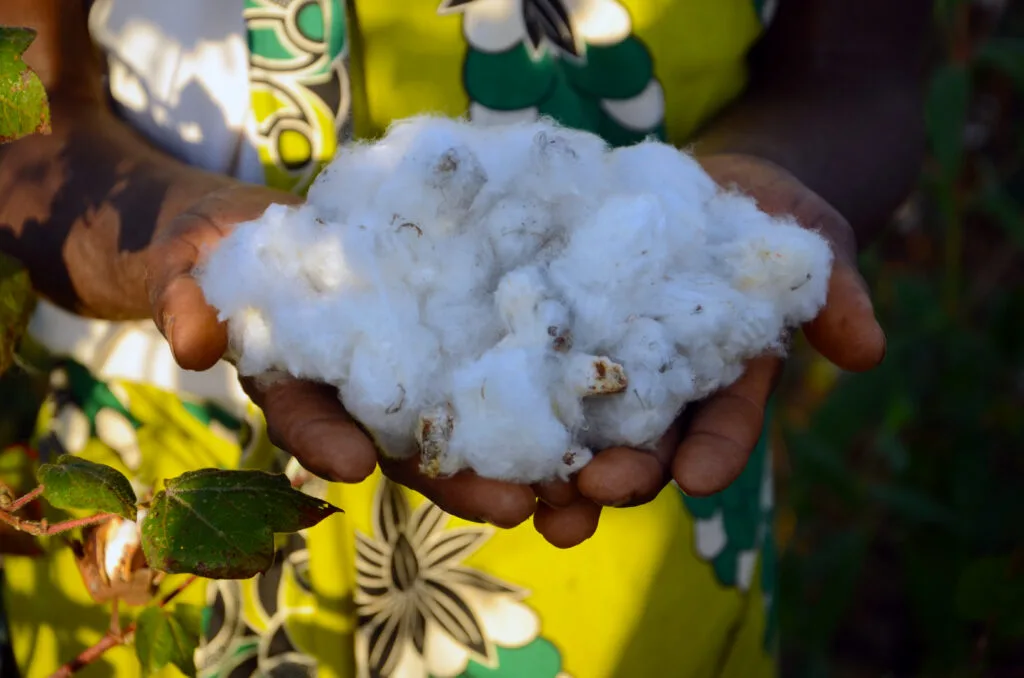

In this Q&A, Hélène Bohyn, Policy & Advocacy Manager at Better Cotton, discusses why Better Cotton has joined the Make the Label Count coalition and our role in advocating for a revision of the European Commission’s Product Environmental Footprint (PEF) methodology. Hélène shares her insights into the coalition’s goals, ongoing efforts to combat greenwashing, and how Better Cotton plans to support the cause in 2025.
Why has Better Cotton decided to join Make the Label Count?


Better Cotton’s support for the Make the Label Count coalition reflects our broader commitment to advancing genuine sustainability in the fashion and textile sectors.
We have joined this coalition to advocate for a revision of the European Commission’s Product Environmental Footprint (PEF) methodology. The coalition, which includes over 55 natural fibre organisations and environmental groups, argues that the current PEF methodology fails to adequately account for environmental impacts unique to synthetic fibres. These include microplastic release, post-consumer plastic waste, and the non-renewable nature of these materials.
If these three key environmental indicators are not included in the PEF methodology – which is likely to not be finalised before the adoption of the Green Claims Directive – the coalition will advocate against its use as the go-to method for substantiating green claims under the Directive.
Through this partnership, we aim to champion cotton as a natural fibre and advocate for the inclusion of environmental indicators that capture the complete lifecycle and impact of each fibre. This would play a key role in eradicating greenwashing and ensuring that sustainability information in the fashion and textile sectors is fair, transparent, and credible.
What impact does Better Cotton hope to achieve by supporting the Make the Label Count coalition?
Increasing recognition of the sustainability attributes of natural fibres like cotton: Cotton offers significant environmental and social benefits compared to synthetic alternatives, which are derived from fossil fuels. Unlike man-made fibres, cotton is biodegradable, has a lower carbon footprint during disposal, and supports the livelihoods of millions worldwide by preserving cultural traditions and providing vital employment opportunities. By raising awareness of these attributes, we aim to encourage members to prioritise natural fibres over synthetics, fostering a potential shift in consumer preferences and industry practices toward more sustainable materials.
Influencing EU policy: Joining the coalition allows us to advocate for a more holistic and equitable approach to evaluating the environmental impact of textiles. This means influencing EU regulators as well as enhancing the visibility and recognition of voluntary sustainability standards like Better Cotton within the fashion and textile industry.
Enhancing accuracy in sustainability metrics: Adopting the proposed changes to the methodology would ensure that sustainability metrics more accurately reflect the environmental impact of different textile fibres, leading to fairer and more meaningful assessments.
Reducing greenwashing: By advocating for comprehensive and transparent data, we aim to work towards the eradication of greenwashing. This would ensure sustainability claims are credible and help consumers make informed choices.
What will Better Cotton be doing in 2025 to support Make the Label Count coalition in achieving its goal?
In the first quarter of 2025, a pivotal decision-making moment will occur when the European Commission, European Parliament, and European Council (collectively known as the trilogue) come together to vote on the Green Claims Directive and the preferred methodology for evaluating sustainability metrics in textiles.
In the lead-up to this decision, the coalition is now focusing its efforts on engaging with the European Commission, Members of Parliament as well as the European Council Attachés and their respective Member States working on the file to advocate for a methodology that accurately reflects the true environmental impact for textile products. To advance this agenda and support the coalition’s objectives, we will prioritise the following actions in 2025:
Participating in meetings: We will actively engage in meetings with coalition members and policymakers organised by the coalition to ensure our perspective is included in discussions that shape future regulations.
Increasing visibility and influence: We will promote the coalition by speaking about it in public forums, encouraging others to join, and leveraging high-profile opportunities to raise awareness and build momentum.
Responding to EU public consultations: We will submit aligned feedback in response to EU calls for evidence and public consultations, such as those recently provided on the Digital Product Passport, ensuring our contributions echo the demands of the coalition.
Engaging with voting members: We will explore opportunities to engage with voting members among EU Member States, and retailers and brands within our membership, fostering dialogue and raising awareness about the coalition’s goals to encourage their support for the initiative.
Interested in learning more? Get involved and join us in the journey to make the label count.







































